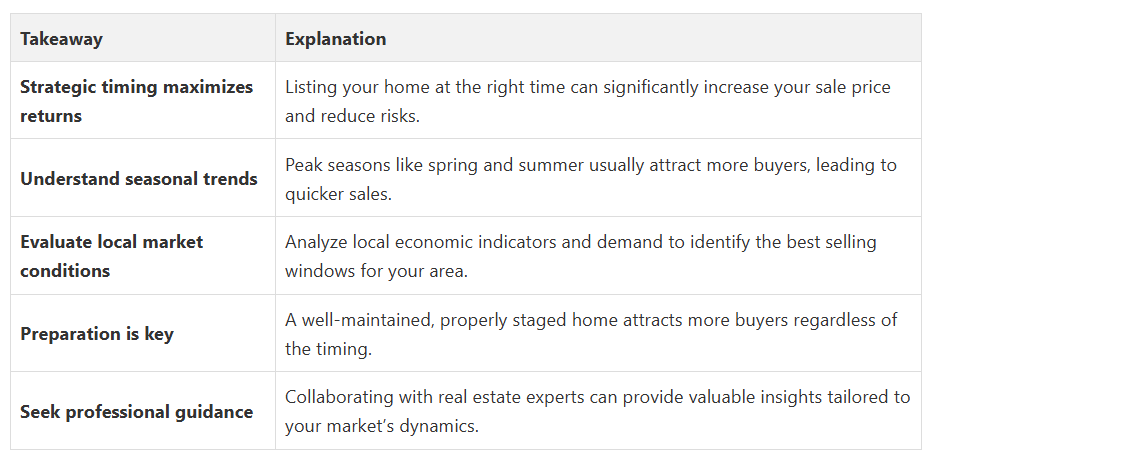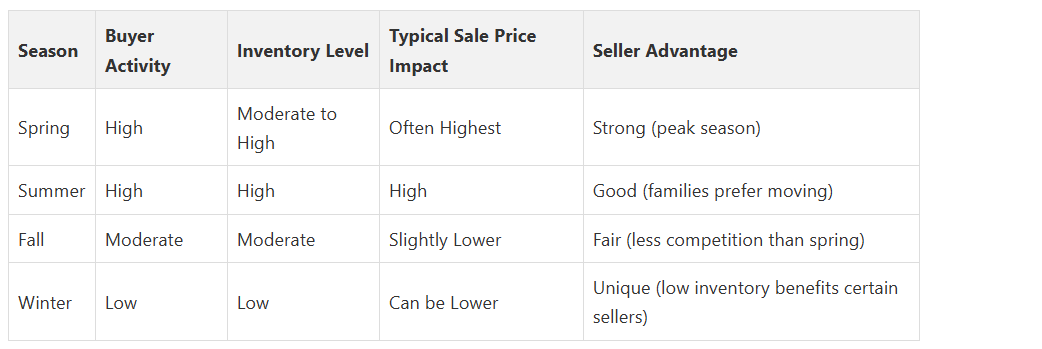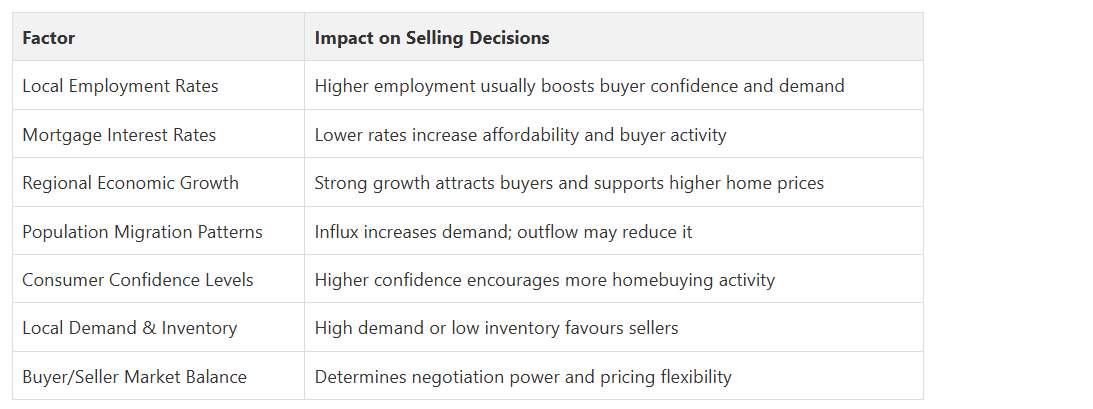
Understanding the Best Time to Sell a Home in the Toronto & Durham Region Market
The usual belief is that any time can be a good time if the market looks solid, but listing during peak seasons like spring and early summer can increase your sale price by thousands of dollars. Most people focus only on curb appeal or upgrades, yet the actual timing of your sale could play a bigger role in how much you walk away with.
Selling home timing represents a strategic approach to listing residential properties at precise market moments to maximize financial returns and minimize potential risks. Understanding the nuanced concept of selling home timing involves recognizing how external market conditions, seasonal trends, and local real estate dynamics intersect to create optimal selling opportunities.
Real estate markets are inherently dynamic, with property values fluctuating based on numerous interconnected factors. Selling home timing is not merely about choosing a random date but about carefully analyzing economic indicators, local demand, inventory levels, and buyer sentiment in areas like Toronto, Pickering, Oshawa, Whitby, Ajax, and surrounding regions.
Successful selling home timing requires understanding multiple strategic components. Homeowners must evaluate personal circumstances alongside broader market conditions. For instance, selling during peak buyer seasons like late spring can potentially yield higher sale prices.
Seasonal trends play a crucial role in shaping the real estate market dynamics, particularly in regions like Toronto, Durham, Oshawa, Whitby, Ajax, and surrounding areas. These cyclical patterns significantly influence buyer behaviour, property valuations, and overall market performance throughout the year.
Real estate markets experience predictable shifts driven by seasonal changes. Spring and summer traditionally represent peak selling seasons, characterized by increased buyer activity and more favourable market conditions. Families often prefer moving during these months to minimize school disruption and take advantage of better weather for property viewing and relocation.

Homeowners must strategically time their property listings to maximize potential returns. Winter months typically feature lower inventory, which can create unique opportunities for sellers willing to list during traditionally slower periods. Explore seasonal selling strategies to understand how timing can impact your home sale.
Market conditions represent a complex ecosystem of interconnected economic factors that profoundly impact residential real estate transactions. Understanding these dynamics is crucial for homeowners in Toronto, Oshawa, Whitby, Ajax, Pickering, and surrounding areas looking to make informed selling decisions.
Real estate markets are sensitive ecosystems driven by multiple economic indicators. Interest rates, employment levels, local economic development, and broader national economic trends collectively shape buyer behaviour and property valuations. A deep understanding of these factors helps sellers strategically position their properties for maximum financial benefit.
Successful home selling requires a nuanced approach to understanding current market conditions. Sellers must evaluate whether they are operating in a buyer’s or seller’s market, which directly impacts pricing strategies, negotiation power, and potential sale timelines.
Optimal selling timing in the Toronto real estate market requires a sophisticated understanding of multiple interconnected variables. Homeowners in Toronto, Oshawa, Whitby, Ajax, Pickering, and surrounding areas must carefully evaluate a comprehensive range of factors to maximize their property’s market potential.
Successful home selling begins with thorough preparation. Beyond market conditions, sellers must consider personal circumstances, property condition, and strategic positioning. A home that is well-maintained, properly staged, and priced competitively will attract more potential buyers regardless of seasonal fluctuations.
Comprehensive market analysis involves examining hyperlocal trends specific to neighbourhoods in the Greater Toronto Area. Interest rates, local economic indicators, and population migration patterns play crucial roles in determining the most advantageous selling window.
Timing the sale of your home can feel overwhelming, especially with ever-changing market conditions and the weight of making the right financial move. Our article highlighted how selling home timing in Toronto and Durham is about more than just picking a date. You want to catch the peak moment for your property value, but navigating shifting market trends, seasonal fluctuations, and local demand is no simple task. The pressure to choose wisely is real. If you want confidence, guidance, and a clear plan, Fanis Makrigiannis at Fanis.ca is your best partner.
What is selling home timing, and why is it important in the Toronto market?
Selling home timing is the strategic approach to listing properties at optimal moments to maximize sale prices and minimize risks. It is important in the Toronto market due to fluctuating property values influenced by various economic and seasonal factors.
How do seasonal trends affect home sales in Toronto?
Seasonal trends significantly impact buyer behaviour and property valuation. Spring and summer are typically peak selling seasons, with increased buyer activity, while winter often sees reduced market activity and lower inventory.
What factors should homeowners consider for optimal selling timing?
Homeowners should assess several factors, including local market conditions, property readiness, personal circumstances, and economic indicators like interest rates and employment levels to determine the best time to sell.
How do market conditions influence selling decisions in Toronto?
Market conditions, including buyer’s or seller’s market dynamics, economic growth, mortgage interest rates, and consumer confidence levels, play a critical role in shaping selling strategies and pricing decisions.
Seasonal Home Selling Tips: Toronto and Durham Region 2025 - Fanis Makrigiannis Realtor®
Home Selling Tips for Toronto and Durham 2025 - Fanis Makrigiannis Realtor®
Selling Your Home Faster in Toronto & Durham 2025 - Fanis Makrigiannis Realtor®
Selling a House Fast in Toronto & Durham Guide in 2025 - Fanis Makrigiannis Realtor®
Table of Contents
- What Is Selling Home Timing And Why It Matters
- Market Sensitivity And Property Value
- Strategic Timing Components
- The Impact Of Seasonal Trends On Home Sales
- Understanding Seasonal Market Fluctuations
- Strategic Considerations For Sellers
- How Market Conditions Influence Selling Decisions
- Economic Indicators And Market Sentiment
- Navigating Market Complexity
- Key Factors To Consider For Optimal Selling Timing
- Property And Personal Readiness Assessment
- Strategic Market Analysis
Quick Summary
What is Selling Home Timing and Why It Matters
Market Sensitivity and Property Value
According to Zillow’s research, strategic listing periods can significantly impact sale prices and transaction speed.
Key considerations for effective home-selling timing include:
- Local market temperature
- Seasonal buyer activity
- Interest rate environments
- Neighbourhood-specific trends
- Economic indicators
Strategic Timing Components
Working with a professional Real Estate Agent in Oshawa can provide crucial insights into optimal selling windows, helping homeowners navigate complex market dynamics and make informed decisions about property transactions.
The Impact of Seasonal Trends on Home Sales
Understanding Seasonal Market Fluctuations
Below is a table outlining how different seasons in Toronto typically affect home sales, making it easier to compare the pros and cons of each period for potential sellers.
According to the Toronto Regional Real Estate Board, market performance varies dramatically across different seasons. Specific seasonal characteristics include:

- Higher buyer demand during spring and early summer
- Reduced market activity during winter months
- Price variations correlated with seasonal inventory levels
- Increased competition among sellers during peak periods
- More negotiation opportunities during slower seasons
Strategic Considerations for Sellers
Navigating seasonal trends requires comprehensive market knowledge and professional guidance. Local real estate professionals can provide insights into micro market conditions, helping sellers optimize their listing strategy based on current economic indicators and regional dynamics.
How Market Conditions Influence Selling Decisions
To help clarify how market and seasonal factors interact to impact home sales, the following table summarizes key factors influencing selling decisions, along with their corresponding effects.
Economic Indicators and Market Sentiment
According to research from the Federal Reserve Bank of St. Louis, market disruptions can dramatically alter selling strategies.
Key economic factors influencing selling decisions include:
- Local employment rates
- Mortgage interest rates
- Regional economic growth
- Population migration patterns
- Consumer confidence levels
Navigating Market Complexity
Learn more about navigating market dynamics to make strategic decisions that align with current economic realities.
Professional real estate agents provide critical insights, helping homeowners interpret complex market signals and develop targeted selling strategies tailored to specific neighbourhood and regional trends.
Key Factors to Consider for Optimal Selling Timing
Property and Personal Readiness Assessment
According to research on housing market forecasting, understanding granular market dynamics can significantly impact selling strategies.
Critical factors for optimal selling timing include:
- Current property valuation
- Home renovation and repair status
- Personal financial objectives
- Potential relocation timelines
- Emotional readiness for transition
Strategic Market Analysis
Explore a detailed timeline for home selling to understand how different factors converge to create optimal selling opportunities. Professional real estate agents can provide nuanced insights, helping sellers navigate complex market dynamics and make informed decisions that align with their specific goals and market conditions.
Unlock Your Perfect Selling Window With Real Toronto Expertise
Stop second-guessing your selling strategy. Discover how professional insights and tailored marketing can help you sell at the right time for maximum profit. Access up-to-date property values, neighbourhood expertise, and personalized selling timelines created for the Toronto and Durham region. Connect today at Fanis.ca to request your complimentary home evaluation and secure your competitive edge before the market changes again.
Frequently Asked Questions
How do seasonal trends affect home sales in Toronto?
What factors should homeowners consider for optimal selling timing?
How do market conditions influence selling decisions in Toronto?
Contact me personally to learn more.
About the author:
Fanis Makrigiannis is a trusted Realtor with RE/MAX Rouge River Realty Ltd., specializing in buying, selling, and leasing homes, condos, and investment properties. Known for his professionalism, market expertise, and personal approach, Fanis is a Real Estate agent in the Durham region, is committed to making every real estate journey seamless and rewarding.
He understands that each transaction represents a significant milestone and works tirelessly to deliver outstanding results.
With strong negotiation skills and a deep understanding of market trends, Fanis fosters lasting client relationships built on trust and satisfaction.
Proudly serving the City of Toronto • Ajax • Brock • Clarington • Oshawa • Pickering • Scugog • Uxbridge • Whitby • Prince Edward County • Hastings County • Northumberland County • Peterborough County • Kawartha Lakes
Fanis Makrigiannis
Real Estate Agent
RE/MAX Rouge River Realty LTD
(c): 905.449.4166
(e): info@fanis.ca
Recommended
Home Selling Tips for Toronto and Durham 2025 - Fanis Makrigiannis Realtor®
Selling Your Home Faster in Toronto & Durham 2025 - Fanis Makrigiannis Realtor®
Selling a House Fast in Toronto & Durham Guide in 2025 - Fanis Makrigiannis Realtor®








